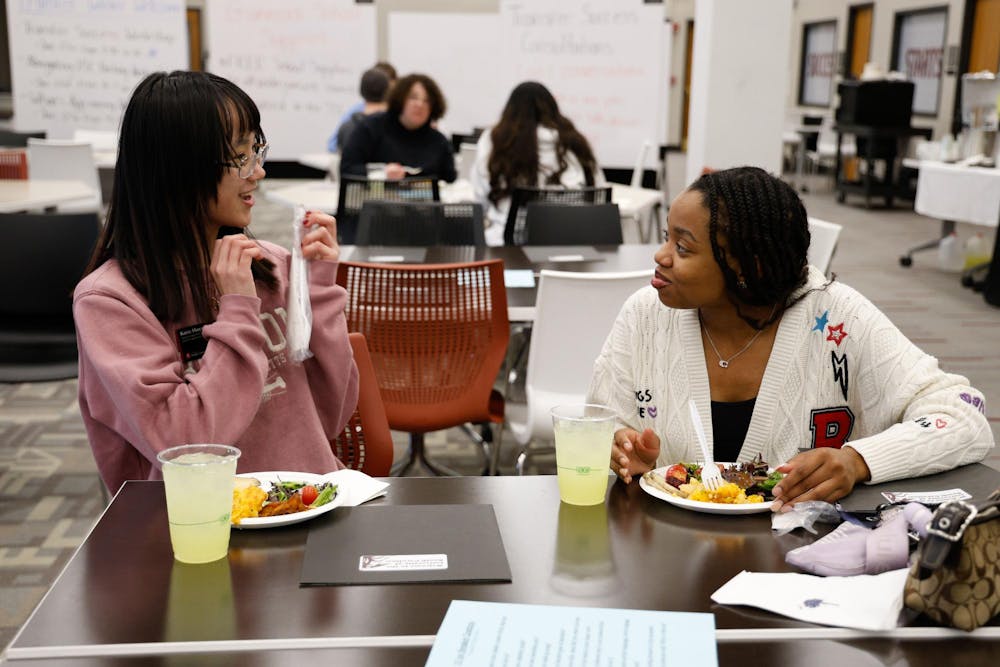Carolina Experience, an office at USC aiming to help transfer students, has organized several events this semester as part of its Transfer Winter Welcome.
The office was founded in February 2024 when the university hired Director Amber Fallucca, PhD. Its student offerings began that fall. There are 15 Carolina Experience peer leaders who receive over 40 hours of training on campus resources, she said.
An important function of the office is helping transfer students find outlets for personal expression, said third-year operations and supply chain student Alex Miller, who was hired to be a peer leader in fall 2024.
“Where would they like to go hang out? If someone’s very artistically inclined, where would we recommend them to go for that kind of environment?” Miller said.
They also help students navigate campus technologies, such as Self Service Carolina or the apps for parking, Miller said. The office even has a list of USC slang terms for inquiring transfer students.
Third-year theater student Morgan Passley is a Carolina Experience peer leader and the president of the Association of Transfer Students at USC. She transferred to the university after feeling that her old school was small and lacked activities and resources for theater, she said.

Her biggest challenge as a transfer student was finding friends. She pushed herself into spaces where she knew she would make connections, and she succeeded after joining a group playing basketball in the gym.
Understanding students’ needs is the most significant part of her work as a peer leader, Passley said.
“I think the most important work that we do here is listening to the students,” Passley said. “A lot of these students that come here, they’re looking for something to make them at ease.”
On Jan. 16, Carolina Experience held a welcome dinner for transfer students in the Student Success Center. At this event, students and peer leaders spoke over a catered meal before playing a game of USC trivia.
Second-year aerospace engineering student Christopher Steves came to the dinner after hearing about it from one of the monthly emails sent to transfer students. He recently transferred from Horry-Georgetown Technical College in Myrtle Beach. He said he likes the amount of events that take place early in the semester and has already found a Christian group to take part in.
“The transfer process itself has been really great,” Steves said. “I’ve never seen any school do something like this event specifically, with the trivia and the dinner, so that is awesome.”
Earlier, on Jan. 14 and 15, peer leaders handed out flyers with advice for students, while handing out free doughnuts, in an event named “Dos and Donots.” Future events include a transfer success workshop in the Student Success Center on Jan. 21, and an online workshop on parking and commuting on Jan. 23.
Fallucca said the office’s origins lay in a fall listening tour put on by President Michael Amiridis and other USC senior leadership, early in Amiridis’ tenure. Feedback from that tour suggested that while USC does a lot for students in their first year, the question of “What’s after that?” remained, she said.
For Fallucca, an important step is connecting students to existing resources, especially those students who missed out on a freshman year at USC.
“We do a lot for students,” Fallucca said. “But where we could improve is where we could package and provide continuity and elevate some of these opportunities specific to students in the transfer sophomore, junior and senior year.”
In fall 2024, over 400 appointments were booked with Carolina Experience, most of which came from fourth-year students, Fallucca said.
Students can discuss a variety of topics with peer leaders by booking these appointments through Navigate.
“We like to call them ‘triage appointments’ because it could be anything from ‘How do I work through parking or dining’ questions?' or ‘How do I think about my academic advisement?'" Fallucca said.
This spring, the office is starting a “life hack series,” Fallucca said. This will include life-oriented discussions on cost-of-living calculations, lease negotiations and car maintenance. The idea for this project came from feedback from upperclassmen who were concerned about the next phase of their life, she said.
The office will continue to update its programming based on the feedback it receives, Fallucca said.
“We don't have it all figured out, intentionally," Fallucca said. "We have a lot of pieces and structure in place, but we want to continually hear from the feedback from our students, from the faculty, the staff and where they see gaps."

